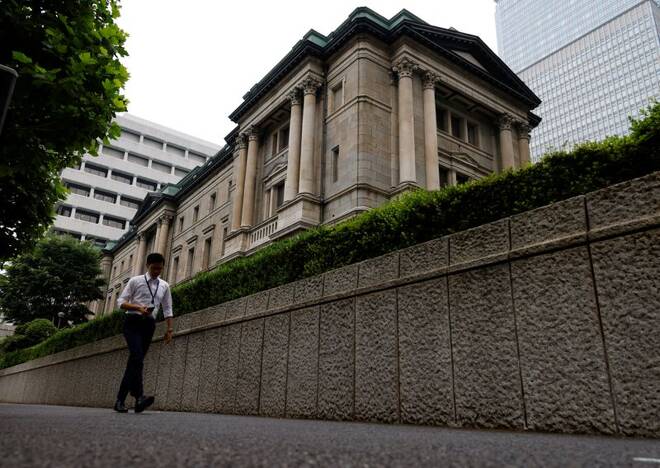Advertisement
Advertisement
BOJ focused on wages, yen at June meeting, no debate on tweaking yield cap
By:
TOKYO (Reuters) - Bank of Japan (BOJ) board members saw the need to maintain ultra-loose monetary policy to prop up wages and spur demand-driven rise in inflation, a summary of opinions at their June policy meeting showed on Monday.
By Leika Kihara
TOKYO (Reuters) -Many Bank of Japan (BOJ) policymakers saw stronger wage growth as key to sustaining the bank’s 2% inflation goal, according to a summary of opinions expressed at a June meeting, underscoring their resolve to maintain ultra-low interest rates.
The summary of views voiced at the bank’s June 16-17 rate-setting meeting, published on Monday, showed one board member said sharp yen falls could hurt the economy by making it difficult for companies to set business plans, highlighting policymakers’ concern over the currency’s plunge to 24-year lows.
At the meeting, the BOJ stuck to its ultra-low interest rate policy and vowed to defend its cap on the 10-year bond yield with unlimited buying, bucking a global wave of monetary tightening in a show of resolve to focus on supporting a tepid economic recovery.
There was no trace in the summary – in which commenters are not identified by name – of any discussion by the BOJ board of raising interest rates to slow the pace of yen declines, with many stressing the importance of keeping monetary policy ultra-loose.
“A growing number of goods are seeing prices rise due to higher commodity costs and currency volatility. But it’s appropriate to maintain current monetary policy” as the price gains aren’t driven by strong demand, one member said.
According to another opinion expressed, “In order to achieve sustained wage hikes that can drive up demand, the BOJ must sustain its current monetary policy and underpin the economy.”
Several other commenters pointed to the need to stimulate the economy long enough to boost wage growth, which remains far more subdued in Japan than in other countries, the summary showed.
The growing policy divergence on interest rates between Japan and the rest of the world – where rate hike cycles are well under way – has pushed the yen to 24-year lows against the U.S. dollar, threatening to cool consumption by boosting already rising import costs.
Some market players had speculated the BOJ could give into market forces and tweak its yield cap policy in June, to allow Japan’s long-term interest rates to rise more.
(Reporting by Leika Kihara; Editing by Shri Navaratnam and Kenneth Maxwell)
About the Author
Reuterscontributor
Reuters, the news and media division of Thomson Reuters, is the world’s largest international multimedia news provider reaching more than one billion people every day. Reuters provides trusted business, financial, national, and international news to professionals via Thomson Reuters desktops, the world's media organizations, and directly to consumers at Reuters.com and via Reuters TV. Learn more about Thomson Reuters products:
Did you find this article useful?
Latest news and analysis
Advertisement
